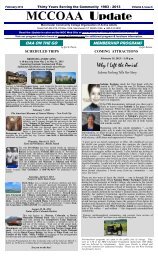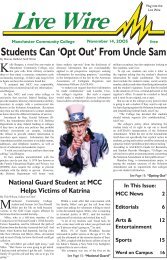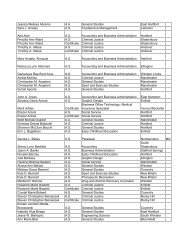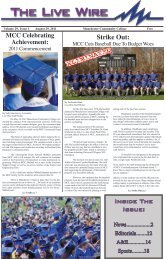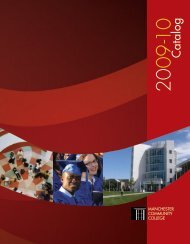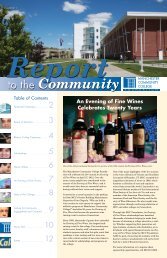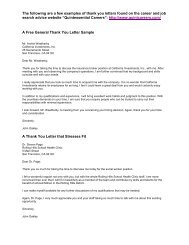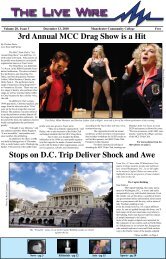Liberal Arts and Science - Manchester Community College ...
Liberal Arts and Science - Manchester Community College ...
Liberal Arts and Science - Manchester Community College ...
Create successful ePaper yourself
Turn your PDF publications into a flip-book with our unique Google optimized e-Paper software.
course <strong>and</strong> will include problems in area, volume, arc length <strong>and</strong> exponential<br />
growth <strong>and</strong> decay: (Estimation <strong>and</strong> approximation techniques are considered<br />
throughout the course <strong>and</strong> include methods for approximating solutions to<br />
equations, methods of numerical integrations, <strong>and</strong> the use of power series<br />
to approximate functions.) Solutions of these problems will require the use of<br />
graphing calculator <strong>and</strong>/or Maple software. A TI-83, TI-83+ or TI-86 graphing<br />
calculator is required. Prerequisites: “C” or better in ENG* 101 (recommended)<br />
or concurrent registration in ENG* 101 (acceptable) <strong>and</strong> “C” or better in MAT*<br />
250. (Fa,Sp) 4 credits<br />
MAT* 268: Calculus III: Multivariable<br />
(formerly MATH 293: Analytic Geometry <strong>and</strong> Calculus III)<br />
A course in multivariable calculus with analytic geometry for students of<br />
mathematics, science <strong>and</strong> engineering. Topics include: parametric equations,<br />
two-<strong>and</strong> three-dimensional vector algebra, vector differential calculus, differentiation<br />
of functions of several variables, multiple integrals, <strong>and</strong> line <strong>and</strong> surface<br />
integrals. Applications are considered throughout. Computer software <strong>and</strong>/or<br />
graphic calculators will be integrated as appropriate throughout the course.<br />
Class: 4 hours per week. Prerequisites: MAT* 256 <strong>and</strong> “C” or better in ENG*<br />
101. (Fa) 4 credits<br />
MAT* 272: Linear Algebra<br />
(formerly MATH 220: Introduction to Linear Algebra)<br />
A first course in linear algebra for students in mathematics, science <strong>and</strong> engineering.<br />
Topics include: systems of linear equations, matrices, determinants,<br />
vectors <strong>and</strong> vector spaces, linear transformations, eigenvalues <strong>and</strong> eigenvectors.<br />
Applications will be considered with emphasis on numerical methods.<br />
Computers <strong>and</strong>/or graphing calculators will be integrated as appropriate.<br />
Class: 3 hours per week. Prerequisites: MAT* 256 <strong>and</strong> “C” or better in ENG*<br />
101. (O) 3 credits<br />
MAT* 285: Differential Equations<br />
(formerly MATH 201)<br />
An introductory course in differential equations. Solution methods for differential<br />
equations including selected first order equations, nth-order equations, <strong>and</strong><br />
systems of linear equations using matrix techniques, Laplace transforms, <strong>and</strong><br />
numerical methods. Series techniques for selected linear differential equations<br />
including Bessel’s equation will be considered. Computer software <strong>and</strong>/or<br />
graphing calculators will be integrated as appropriate throughout the course.<br />
Recommended for science <strong>and</strong> engineering students. Class: 4 hours per week.<br />
Prerequisites: MAT* 256 <strong>and</strong> “C” or better in ENG* 101. (Sp) 4 credits<br />
MAT* 287: Set Theory <strong>and</strong> Foundations<br />
(formerly MATH 250)<br />
A formal introduction to the basic concepts of modern abstract mathematics.<br />
Topics include: symbolic logic, sets <strong>and</strong> relations, recursive <strong>and</strong> inductive procedures,<br />
functions, cardinality, algebraic structures, graph theory, <strong>and</strong> methods<br />
of proof. Class: 3 hours per week. Prerequisites: MAT* 254 or MAT* 250 <strong>and</strong><br />
“C” or better in ENG* 101. (O) 3 credits<br />
Meteorology<br />
MET* 101: Meteorology<br />
(formerly MTEO 110: Introduction to Meteorology)<br />
An introduction to the principles of atmospheric behavior, with emphasis on<br />
atmospheric motion, general circulation, air masses <strong>and</strong> frontal systems,<br />
clouds <strong>and</strong> precipitation, <strong>and</strong> their relation to climate <strong>and</strong> weather formations.<br />
A field trip to a local weather bureau may be included. Class: 3 hours per<br />
week. (Fa) 3 credits<br />
Multimedia, See Digital <strong>Arts</strong><br />
Music<br />
MUS* 101: Music History <strong>and</strong> Appreciation I<br />
(formerly MUS 111: History <strong>and</strong> Appreciation of Music)<br />
A survey of western music from medieval times through the baroque period,<br />
with an introduction to the concept of sound, melody, rhythm, harmony, texture<br />
<strong>and</strong> form. Emphasis will be given to major developments in polyphonic music<br />
along with the rise of vocal <strong>and</strong> instrumental compositions. Class: 3 hours per<br />
week. (Fa) 3 credits<br />
MUS* 102: Music History <strong>and</strong> Appreciation II<br />
(formerly MUS 112: History <strong>and</strong> Appreciation of Music II)<br />
A survey of western music from the classical period to modern times with<br />
emphasis given to the major music forms (i.e. symphony, concert, art song,<br />
opera) of composition as well as pieces that have literary or other non-musical<br />
associations. A review of music concepts such as sound, melody, harmony,<br />
rhythm <strong>and</strong> form. Class: 3 hours per week. (Sp) 3 credits<br />
MUS* 107: Today’s Music<br />
(formerly MUS 113: Today’s Music I: Traditional Folk, Latin, Country, Blues<br />
<strong>and</strong> Rock)<br />
A music appreciation course that examines the development of American<br />
music from its roots in Anglo, African, Native <strong>and</strong> Latin American traditions to<br />
the evolved styles of country, blues, folk, rock” n” roll. Emphasis will be given<br />
to the impact of these earlier styles on contemporary practices.. Class: 3 hours<br />
per week. (Fa) 3 credits<br />
MUS* 111: Fundamentals of Music I<br />
(formerly MUS 211: Fundamental of Music)<br />
As a beginning course in the theory of music, students will be introduced to<br />
the skills necessary to read, write <strong>and</strong> perform music, with basic training in<br />
pitch <strong>and</strong> emphasis on performance. Recommended: basic piano skills. Class:<br />
3 hours per week. (Fa) 3 credits<br />
MUS 114: Today’s Music II: Gospel, Ragtime, Blues, Jazz<br />
An examination of the development of American music from it’s roots in the<br />
secular <strong>and</strong> sacred traditions of the late 1800’s <strong>and</strong> their impact on the pre-jazz<br />
forms of ragtime, brass b<strong>and</strong>s <strong>and</strong> blues to the jazz forms of swing, bebop,<br />
cool <strong>and</strong> fusion. Emphasis will be given to the stylistic characteristics of each<br />
form <strong>and</strong> their impact on current music styles. Class: 3 hours per week (Sp)<br />
3 credits<br />
MUS* 124: Music of the Classical Period<br />
(formerly MUS 251: Music History I: The Classical Period)<br />
A study of Western European music development from the early 18th century<br />
to the early 19th century. Topics will include: an overview of the transitional<br />
pre-classical period <strong>and</strong> it’s impact on the music <strong>and</strong> composers of the classical<br />
period, an analysis of the significant musical styles of the period, a<br />
biographical study of the key composers <strong>and</strong> the impact of the culture on the<br />
music development of the period.. Prerequisite: eligibility for ENG* 101. Highly<br />
recommended: MUS* 101. (Fa) 3 credits<br />
MUS* 148: Beginning Piano<br />
(formerly MUS 215)<br />
Students will be introduced to the piano keyboard <strong>and</strong> will acquire basic skills<br />
in reading general music notation, music notation related to the piano <strong>and</strong> an<br />
underst<strong>and</strong>ing <strong>and</strong> application of basic chords. Students will also receive a<br />
foundation in music theory <strong>and</strong> appreciation. Highly recommended for Music<br />
Option students needing basic piano skills for MUS* 111. Class: 3 hours per<br />
week. (Fa,Sp) 3 credits<br />
Next Semester Offered Designations: Fa = Fall, O = Occasional, Sp = Spring, Su = Summer 141<br />
COURSES



